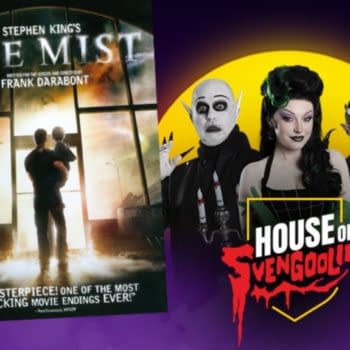Posted in: Movies, Recent Updates | Tagged: entertainment, film, indy filmmaking, production, Robin Hood Films
Film Schooling – Insider Insights On Indy Filmmaking: Production And Peace,War, And Snacks
By Chris Hood
(This is Part Fifteen of an ongoing series to help educate aspiring filmmakers on the process of making their first film. Previous articles in this series can be found at BleedingCool.com and MovieIndustry.com) Parts: 1, 2, 3, 4, 5, 6, 7, 8, 9, 10, 11, 12, 13, 14
There is something about a film set that's akin to going into combat. Now, before those same lame politically correct, saber rattling morons attack me like they did Gwyneth Paltrow, I'm not suggesting it's as dangerous or important or potentially tragic as actual combat…okay, maybe it can be as tragic if you've ever seen M. Knight Shyamalan's The Village (not the worst film ever made…just the worst one that decade). What I'm trying to relay is there are elements to a production that incorporate and include brotherhood, loyalty, friendship, hardship, stress, pressure, expectation, competition and conflict.
Although as a producer you'd rather not have to deal with any of these things transpiring around you, you'll experience these elements by simple virtue of making a film. The level to which these qualities will manifest themselves comes from a combination of the personalities you've throwing together (which you probably won't know or be able to anticipate in advance) and the nature of the production you've assembled (which is entirely under your control). The first you can only anticipate and the second you're wholly responsible for.
You may very well sink or swim based on the kind of dynamic that emerges around this culmination of components which will comprise your shoot. You'll be managing personalities, putting out fires and investing time in issues that should in no way be issues at all, let along something that you're wasting your time with, but keeping the frail harmony on set has to be done. Some fail and some succeed. Some even become legends…
Now, there are cases of smoothly running productions. It does happen. There's no such thing as a film set where everything goes as planned, but there are those where, for the most part, everyone seems to get along and share a common purpose. I've never worked on one of those, but I do hear they exist. There will be days when members of the cast and crew hate you and vice versa. The interesting thing about a film set is the tacit awareness that the job comes first. In most cases even people who don't get along and/or like each other, seem to put that aside for the collective good.
I'm not a fighter. I don't really raise my voice and create conflict for the sake of conflict or calling attention to myself. I keep my cool for the most part. That's why it's strange for me to work with people who operate in such a vastly different manner. It's odd for me to have an actor call me a "cocksucker" in front of the cast and crew and twenty minutes later sit down next to me and as he excitedly tell me about his idea for a scene we're shooting the next day – as though the altercation of a few minutes earlier never happened. That's weird to me. It's common on a film set. It seems more common with bigger name actors, probably because they're more confident in their job security. Actors seem to be inherently moody and insecure, so learn to deal with that.
Of course, the issues you face as a producer or director will be different from the conflicts among the cast and crew toward each other where they are on "more equal" footing. As the "big cheese" few people will openly defy you, though it will happen, because you're the boss and have the ability to fire them. The more a person thinks they're indispensable, the more likely you'll get push back on any number of issues. As I mentioned in a previous article, this can absolutely start to happen later in the production even with inexperienced major actors of no notable name recognition. For some people, just knowing the production is too far along and that they can't really be replaced seems to empower them with a sense of douchy entitlement. Prepare to eat crow for the sake of the project.
So how best to keep the peace? The fact is that there are people who are never happy; people who bitch regardless of the situation they find themselves in. There is a certain type of person that even if you feed them filet mignon, they'll complain that there's no bearnaise sauce. Some people just like to bitch and complain. Some people look for an excuse to feel slighted or disrespected so they can take to their soapbox and voice their grievances, real or imagined. In this age of social media, the situation seems to have gotten worse. In this era of misguided self-importance, people love to be slighted so they have an excuse to jump on Twitter or Facebook and share with the world how they've just been wronged – "Look at me! I'm important and my feelings have just been hurt! But more importantly…look at me!"
Unfortunately, you can't always spot these types of people right off the bat, but they exist is every walk of life and filmmaking is no exception. As I said before, once you flag this kind of cancerous personality, cut your losses and cut them lose. These types of people don't suddenly "change" and make a worthwhile contribution to your team once they've establishing their true nature. Shitty people will always be shitty. They don't flip a coin in the morning – "Heads, I'll be nice, Tails, here comes the shitheel!"
If you find yourself in one of these situations and can't get rid of the problem (as if often the case with talent), you'd better pull out the kid gloves and have some diplomacy skills. Take off the "big shot" hat so many producers feel they are entitled to and be prepared to hold some hands, kiss some ass, make some concessions and take the blame for things that aren't your fault. Yes, it sucks, but there will be times when it's necessary, I assure you.
Being preemptive is the best advice I can give. Do everything you can to prevent these problems from cropping up in the first place, but if you have those personalities festering in your ranks, they'll find a way to squirm to the top and create dissention, be it major or minor. But a number of people 'ride the fence' of malcontent. Don't give them a good reason to go to the Dark Side. Treat people well. Treat them as equals. Treat them with respect.
I wrote previously about the 'Big Shot' mentality in a previous article and your cast and crew will pick up on that. It breeds resentment with no upside. "Because I'm the producer, that's why," is not an acceptable mantra. Don't be "too good" for anything. If equipment is being put away at wrap, grab a light or stand on your way back to the trucks. If you see craft service unloading supplies and you're heading in that direction, grab a cooler or a case of water. You'll have plenty of downtime in between your myriad important tasks, and there will be opportunity to make everyone's job a tiny bit easier. Take advantage of those as long as it's not compromising your necessary tasks. In the final assessment it is a team project and greasing the wheels is good for all.
The final piece of advice I can give, and you'll hear this from everyone who's ever worked on a film set is to keep people happy through their stomach. Feed your people well. Yes, it's an appreciable cost and money you wish you didn't have to spend, but this is one area you shouldn't skimp. Well-fed people are, generally speaking, happy people. Give them the best food you can afford. Have a good craft service offering. I remember working on Sweet Valley High and (sadly, I admit) hit a high point of my day when stopping at the crafty table and finding a special snack laid out like warm Bagel Bites or hot pretzels or chicken fingers. Those items weren't always there, but it almost felt like a minor victory once a day when I scored a particularly desirable snack. (Kind of like finding Chester Copperpot's corpse and treasured skull-shaped key!)
If you can swing it, send someone out for gourmet coffees in the morning one day. Take orders for smoothies another day. Surprise people with donuts and danishes if you're not offering breakfast. Take the team out for drinks on the final day of shooting for the week. Even if it's not your "thing" to go drinking with the gang, most of those working for you enjoy it and appreciate you ingratiating yourself with them in this manner. Call it politics. You want everyone on your side. If people like you, if they respect you, they'll want to do well for you. As Ben Franklin once said, "You can catch more flies with a spoonful of sugar than a gallon of vinegar."
This is a team sport. If you don't know how to be a good leader, find someone else to produce.
Chris Hood is a writer, producer and director of such films as "Counterpunch" starring Danny Trejo (a Lionsgate release) and "Dirty Dealing 3D" with Michael Madsen and C. Thomas Howell. He is also owner of Robin Hood Films, a Las Vegas-based distribution company representing English language films around the world and operates a film blog at MovieIndustry.com. He's also dead sexy. (Mr. Hood denies any involvement in the creation of this mini-bio.)


















